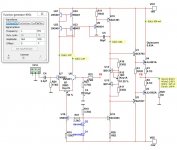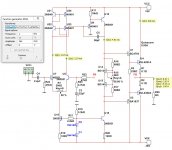Wow! How low can you go with distortion....below unmeasurable, it seems. As the design is only for low power though, what say you about choosing smaller, cheaper CRT deflection transistors in the VAS stage?
I am not sure what you mean by CRT deflection transistors.Wow! How low can you go with distortion....below unmeasurable, it seems. As the design is only for low power though, what say you about choosing smaller, cheaper CRT deflection transistors in the VAS stage?
But here is a version with cheaper VAS transistors.
The distortion stays the same: 0.00006%
Attachments
I'm sorry, but in your case it is the practical implementation of this scheme that remains mysterious.There is nothing mysterius about it.
Just an Class A amplifier with good data.
10 Watt into 8 ohm.
Spice simulation shows THD 0.00006% at 1 Watt output.
You would not regret if you build it.
The Sound should be very good.
firstly, there are no equalizing resistors in the Wilson current mirror..
Secondly, the U9 collector rests on the ground - this will make it difficult to bring it into working condition in case of signal clipping
Thirdly,resistances in the negative feedback circuit have a large rating - this will slow down the entire amplifier.
fourthly, the use of a complementary multiplier U14 U15 in a single-ended implementation of a voltage amplifier driver is not reasonable - this can lead to overcompensation of the output stage
fifthly, there are no capacitances to limit the spectrum of the multiplier
sixth, the support for sources of stable current U16 U18 is taken from the ground, which can lead to modulation with the signal.
seventh, good parameters for an amplifier start at 25 watts at 4 ohms (HiFi standard)
eighth, the value of distortion during Miller correction has little to do with the quality of the amplified signal, because the gain drops with increasing frequency, and therefore the measured distortion decreases with increasing frequency as the gain decreases..... and at the first watt the distortion value is important for class AB amplifiers...
Last edited:
Thanks, I assumed a standard type of small signal transistor would be fine but just not certain. Obsolete CRT or TV picture tube deflection drivers like Toshiba's 2SC3503/2SA1381 are specified here on virtually all larger class AB amplifier designs. i.e. >40W/8RI am not sure what you mean by CRT deflection transistors.
But here is a version with cheaper VAS transistors.
The distortion stays the same: 0.00006%
- Home
- Amplifiers
- Solid State
- Baby Six - 10 Watt Class A Amplifier

